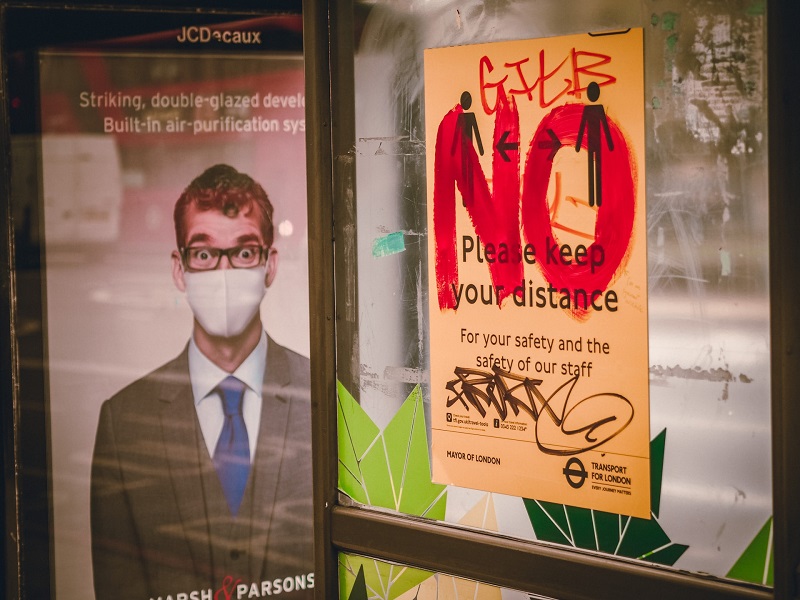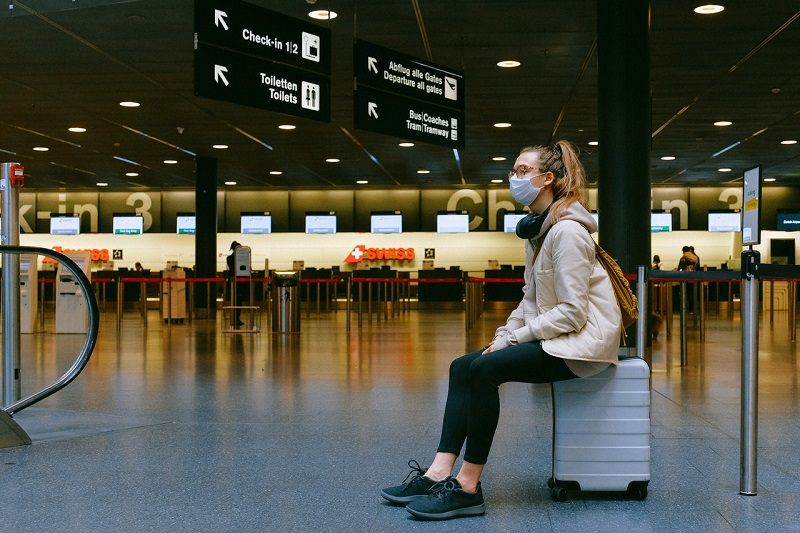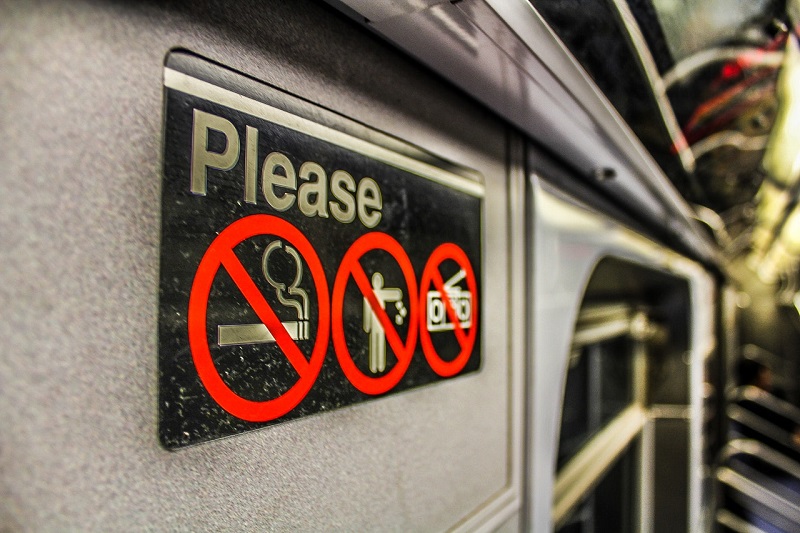
In addition to mask mandates, other government measures such as social distancing have also met resistance. Photo by Liza Pooor / Unsplash
By Ke Ding
Science Communication Volunteer
Browse any social media ‘ TikTok, Twitter, take your pick ‘ and it won’t take long before you come across footage of a standoff in a store or restaurant between employees and a customer who is refusing to wear a facemask.
These kinds of conflicts have become common, and on occasion even turned violent, such as in Michigan, U.S., where a security guard was shot and killed after confronting a defiant shopper.
Some high-profile figures have also spoken out against facemasks. British rock star Noel Gallagher, for example, called them ‘pointless’ and said he had refused to wear one during a recent train journey.
Such public resistance to masks contrasts sharply with the opinion of researchers ‘ including those at Duke University, Duke Kunshan and Duke-NUS Medical School ‘ who say face coverings help reduce the risk of contracting Covid-19, a disease that has caused more than 1 million deaths worldwide, according to the World Health Organization (WHO).
The main transmission routes for Covid-19 are through respiratory droplets, which can occur when standing within one meter of someone coughing or sneezing, and contact with objects or surfaces used by an infected person. Airborne transmission is possible but rare.
While no study proves comprehensively the efficacy of masks, Nature reports that research based on 200 countries shows weekly increases in per-capita mortality from Covid-19 were four times lower in places where masks were the norm or recommended by the government.
Researchers at the University of Iowa also estimate that mask mandates in U.S. states reduced the growth of new cases by up to 2 percentage points a day, averting as many as 450,000 cases.

Photo by Anna Shvets / Pexels
And it’s not just masks; tests show other face coverings can also guard against infection. Separate studies at Duke and the University of Georgia used a simple, low-cost technique to provide visual proof of the efficacy of different face coverings, from hospital-grade N95 masks to bandanas.
‘We want to emphasize that we really encourage people to wear masks, but we want them to wear masks that actually work,’ chemistry professor Martin Fischer, who led the Duke study, told CNN.
Results of the two studies were mostly consistent apart from when it came to gaiters, a type of neckwear popular among runners. Duke researchers found they offer little protection while those at Georgia say multilayer gaiters could outperform facemasks.
Importance of agency, empathy
In the summer, John Ji, an environmental scientist at Duke Kunshan, published analysis with colleagues from the Chinese Center for Disease Control and Prevention that concluded governments should publicize the use of masks among the public and guarantee sufficient supply to curb the rate of infection.
As the pandemic has worsened, many authorities have attempted to do that as well as introduce mask mandates, with varying degrees of severity and success. In Singapore, for example, it’s compulsory to wear a mask outside, with violators risking a fine equivalent to about US$200. Meanwhile in the U.S., businesses have had to enact their own mask policies to protect staff and customers.
However, to understand why some people are resistant to wearing a mask, we need to look past the scientific argument to other factors such as culture, human behavior and politics.
In Western cultures, anecdotal evidence shows some citizens view having to wear personal protective equipment as contrary to their freedom and individualism, while others see it as a sign of weakness.
‘Putting on that mask is about as blatant as saying, ‘Hey, I’m a scaredy cat,” David Abrams, a clinical psychologist at New York University’s School of Global Public Health, told CNN.

Decorative masks have become a fashion accessory for some. Photo by August de Richelieu / Pexels
Across Asia, however, such as in China, Japan and South Korea, the situation is different. Wearing a mask has long been common practice, especially when traveling on public transportation or visiting crowded tourist spots. Masks are even a fashion accessory to some young Asians, who sport varieties carrying popular brand names.
Mixed messaging from health authorities and misleading information online have also hampered efforts to convince people to ‘mask up.’
In the United Kingdom, the government initially advised the public to wear face coverings only on public transportation before changing its policy in the summer to introduce fines for those who failed to wear masks in stores. Even the WHO suggested first that only medical workers and patients who displayed Covid-19 symptoms should wear masks.
To address the problem, public health experts prescribe a heavy dose of empathy. Describing people who refuse to wear masks as ‘selfish,’ as some elected officials have done, is counterproductive, argues Gavan Fitzsimons, professor of marketing and psychology at Duke’s Fuqua School of Business.
‘If you want to minimize resistance, you want to try to give some agency to that shopper,’ he said. ‘Rather than approach and say, ‘Ma’am, you must wear a facemask,’ you might say, ‘Ma’am, the local law says you must wear a facemask. We have three different types, all of which are comfortable. Which of these might you like to use today?”
Benjamin Anderson, assistant professor of global health at Duke Kunshan, also called for trusted community leaders to step in. He added, ‘It could be religious institutions, it could be service organizations. Having that message that goes all the way down on the local and personal level makes for a more impactful message.’

Experts have compared mask mandates to existing safety legislation, such as on seatbelts or smoking. Photo by Tim Savage / Pexels
Legislative language might matter, too. A survey of more than 2,000 residents in Illinois, U.S., found that most responded more positively toward masks when exposed to a message that compared them with wearing a bike helmet or seatbelt. The findings support the idea that linking masks to safety measures already widely adopted could increase compliance with mask mandates.
But in order for this to work, masks must be ubiquitous, experts say. ‘If you walk in there [a store], and you’re the one in 1,000 [without a mask], then you’re the outcast,’ Jill Roberts, an assistant professor at the University of South Florida’s College of Public Health, told CNN. ‘It’s basically peer pressure.’
So much is still unknown about Covid-19, not least the long-term health effects. In addition, while some countries are still battling the initial outbreak, others are preparing for a second or even third wave in winter.
‘Wearing a mask is a simple and easy way to reduce the spread of Covid-19,’ said Duke physician Eric Westman. ‘About half of infections are from people who don’t show symptoms, and often don’t know they’re infected. They can unknowingly spread the virus when the cough, sneeze and just talk.
‘If everyone wore a mask, we could stop up to 99 percent of these droplets before they reach someone else,’ he added. ‘In the absence of a vaccine or antiviral medicine, it’s the one proven way to protect others as well as yourself.’
Ke Ding is a science communications volunteer working under John Ji, assistant professor of environmental science in the Duke Kunshan Environmental Research Center. He is studying for a bachelor’s degree in environmental justice and citizenship at Beloit College, U.S.

